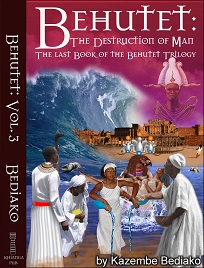
Behutet: The Destruction of Man
The Last Book of the Behutet Trilogy
$24.99
Out of stock
Behutet: The Destruction of Man - The Last Book of the Behutet Trilogy
by Kazembe Bediako
BOOK REVIEW
For readers who relish setting aside a full day to immerse themselves wholly in a good read, one that they find or are recommended, Behutet: The Destruction of Man - The Last Book of the Behutet Trilogy, a 200-page new suspense fiction genre that integrates Ausarian cosmology with contemporary life, written by Kazembe Bediako and published in 2013 by Khianga Publishing, will prove to be a laudable occupant of their entire day.
This is no simple storyline of “good versus evil.” Bediako merges two storylines, one set in the past dynasties of Ancient Egypt - Kamit, and one in the present-day USA, and some of his characters migrate between the two time periods and settings. The author also proposes that “good” and “evil” in society occur in cycles - inevitable cycles. Bediako, through the struggle of the main characters in his novel, also proposes solutions for how to survive the “bad” cycles, how to prepare for, and ride high on the wave during the cycles of “good”, and even suggests ways to prolong the “good” cycle, for centuries. The key he makes available to the reader is the importance of unifying oneself “with the World by replacing information that is restricted to the external aspect of things with knowledge of the underlying principle and essential state of being”. He postulates that “now is the time for the oldest religion known to man to retake its place among the great spiritual teachings in the world in order to lead the world out of its spiritual bankruptcy. It is spirituality - and not war, financial schemes, or politicking - that will save the world.” The state of war and peace within and between nations depends on our leaders especially, and on our own ability to “reunite with God, and replace the words of “man”, that dominate our explanation of ourselves and of God, with those of the Metu Neter,” the Word of God, as instructed in the Ausarian cosmology.
